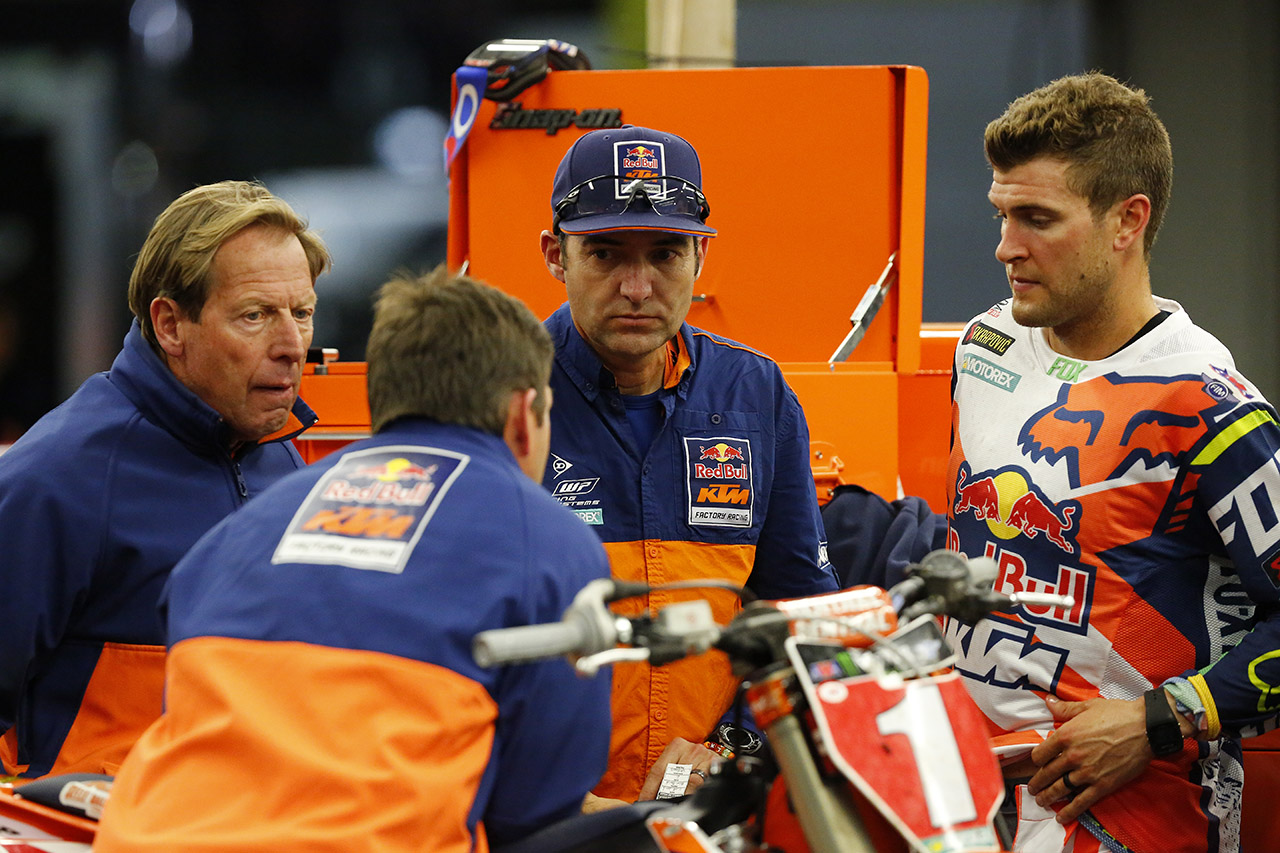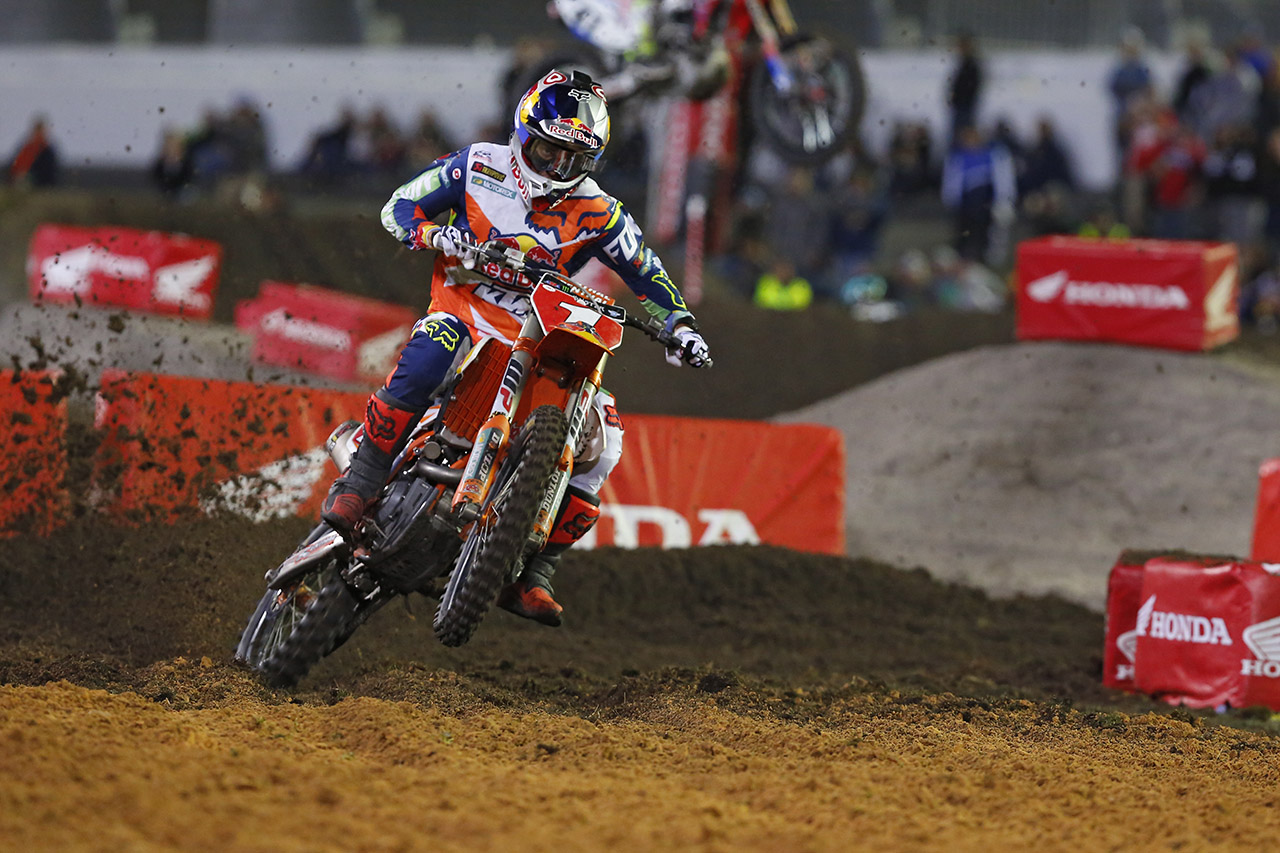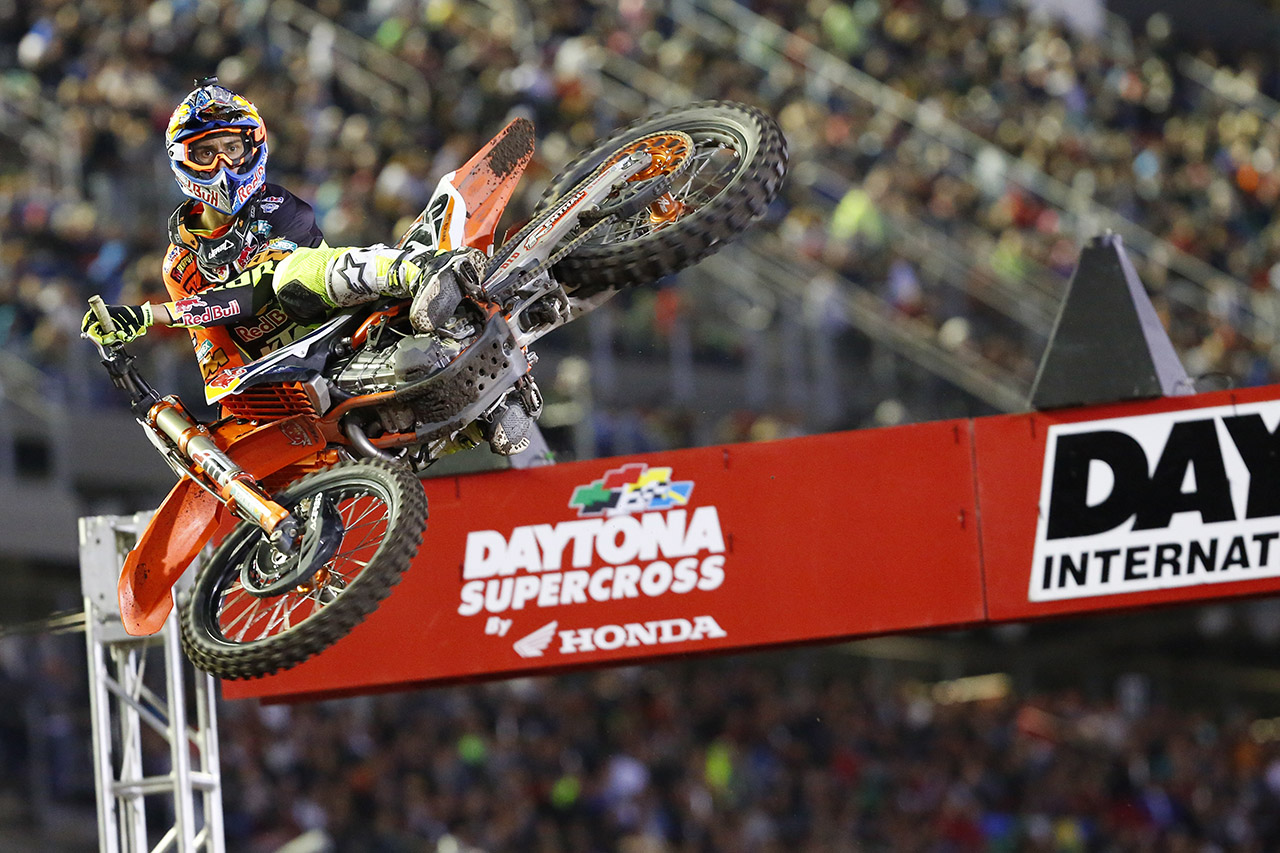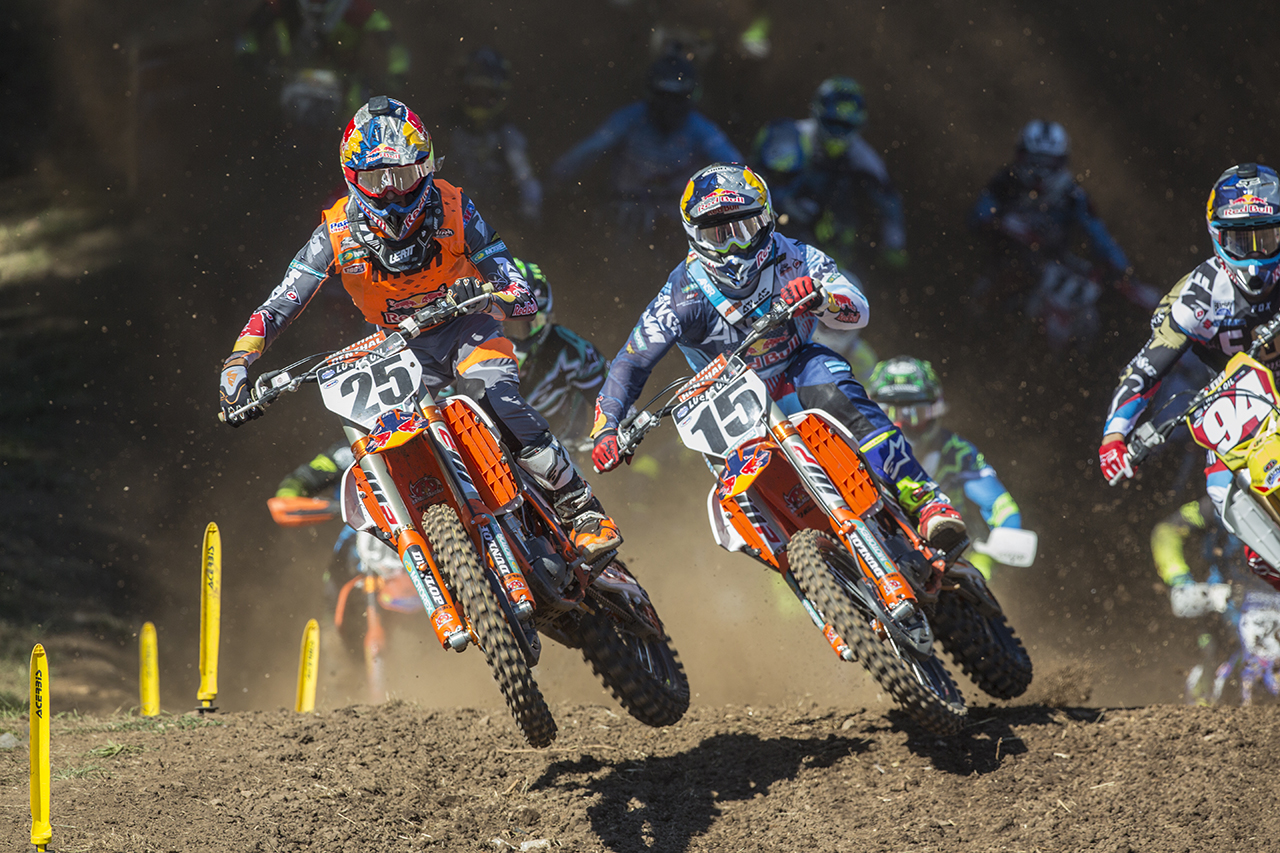INTERVIEW OF THE WEEK: ROGER DeCOSTER
 Roger DeCoster (far left) has a star-studded cast of characters that he gets to work with at KTM, including Ian Harrison (foregroud), Carlos Rivera (hat) and Ryan Dungey (right).
Roger DeCoster (far left) has a star-studded cast of characters that he gets to work with at KTM, including Ian Harrison (foregroud), Carlos Rivera (hat) and Ryan Dungey (right).
“The Man” sounds off on his team riders, KTM’s success, the upcoming USGP rounds, young riders representing Team USA in the MXDN, working for Stefan Pierer, and how the AMA National series needs to improve.
By Anna and Jim Kimball
 In 2016, Ryan Dungey won KTM a second 450 Supercross title.
In 2016, Ryan Dungey won KTM a second 450 Supercross title.
Roger, would you say that it’s been a successful year for you and the Red Bull KTM team? Ryan Dungey won the Supercross title and Marvin Musquin has shown flashes of brilliance in his first season on a 450. Then there was the injury to Dungey during the Nationals and Dean Wilson’s injury.
Right now we are thinking about today and tomorrow. We already kind of forgot about Supercross, but we shouldn’t, because that is the biggest goal of the year to win Supercross. We were able to do that. Marvin Musquin did a really good job for his rookie year on the 450. So, overall, it was a good year. Marvin is in a good place in the outdoor standings and hopefully he can end there [third overall], which could be very good for a rookie. His Supercross series was also very good. If you look at what the press was saying before the season started, they did not give Ryan Dungey much of a chance in Supercross. It was all about Eli Tomac and Kenny Roczen, and Ryan won in a dominant way. I feel he really stepped it up from last year to this year. So, overall, I am pretty happy.
Can Marvin Musquin win a 450 title? And what about Dean Wilson coming back from a blown-out knee?
Like I said, if Marvin can finish third overall, which is his position currently, that would be really good for a rookie. He has the technique to do better with the toughness, and consistency to do it every week. Dean Wilson has had a lot of injuries before he came to us, and he has not been able to change that. It has only been the last few races that he has been able to race, and he is slowly improving. At Budds Creek he was the sixth best rider, which is pretty good for a guy who has not been able to ride more than a dozen races in the past two years. Every year before that he has had several injuries, so it has been tough for Dean. I hope that he can continue to improve and finish good. He will race the two USGPs also, so that gives him a few more races for this season. Hopefully he can finish strong.
Roger, this year is your first year of having the Troy Lee KTM team as KTM’s official factory 250 effort. Do you feel it is better to have the 250 factory team separate from the 450?
For our crew it is a little bit easier. When you race both classes, you basically have no time to address any problems with anybody in particular. You can oversee and tell people what to do, but there is no room to give much personal attention to anyone when you have many guys on the track and the practices are back to back. So you’re basically watching all of the racing. That is the reason why we did it. Things have not gone quite as well as we hoped for this first year, but there are a lot of injuries on the Troy Lee team. I think there are some good people and we have to find a way to give them more support for next season. That way we won’t be in the same situation, so we can give them more help to accomplish what they need to.
 Marvin Musquin will be back on the Red Bull KTM squad in 2017 and looking for that elusive 450 Supercross main event win.
Marvin Musquin will be back on the Red Bull KTM squad in 2017 and looking for that elusive 450 Supercross main event win.
What level of support do you give to the BTO Sports KTM program?
They are not full factory, but they are a support team. We help them to the point where they can get pretty much everything that is on our bikes. We do their engines and suspension, but their budget is not as big as a factory team. They have to find money through sponsorship to pay for a lot of the things. For a team like that, it is not too easy. They don’t replace parts as often as the factory team does. We like to change things often and we get spoiled. Sometimes I think it’s actually better to leave what is on the bike every race, service those parts, and put them back on. There is a tendency for factory teams to replace things just to be safe. Everyone is afraid to be blamed if there is a failure, and that is why you need good mechanics. A good mechanic can judge if a piece should be reused. Our engines run better after one race than after they are newly rebuilt. That is pretty much the same I think with every factory team. The engine becomes freer. It is like when you buy a new car, they run better if you drive around a couple of thousand miles than when they are brand new.
How has your role as team manager of Team USA for the Motocross des Nations changed?
It is definitely more and more difficult for the top guys to want to go and to make it a priority for themselves. There are basically two types of riders. There is the young rider who is into racing, but has no interest in the history of the sport. Then, some young guys are interested in the history of the sport and want to be there to continue creating it. There are still some riders who feel that the Nations is an important event, and they want it on their resume. Cooper Webb is one of them. Actually, all three guys we ended up with this year really wanted to go, and I am really happy for them. I think they will work well together, and hopefully the Europeans underestimate what our guys can do. I think that we can win. They are really tough guys, and there is substantial money for our race team.
What do you mean by that?
There is quite a big expense to pay guys like Eli Tomac, Ryan Dungey, and Kenny[Roczen. They are paid well by race teams, because the expectation to win is there. The riders representing Team USA are not really paid by the factories. The money has to come from the U.S. race programs. Our team riders have the pressure of doing well to justify spending that money. When you consider the money spent to go, it is cool if we win. It has a little bit of a positive effect on bike sales, but the main thing that effects sales in the U.S. is Supercross. The Nationals also have a bit to do with it, so that is why there is a lot of pressure put on racing in the U.S. We put a lot of pressure on the riders, and life can be pretty unhappy if the riders aren’t performing as they should. So, the riders and the trainers, now more and more, try to minimize any event that is outside of the championship. They want to be ready for Anaheim 1, meaning they want to be rested and able to train and test. We all know that taking overseas flights is not the easiest on your body. I think the motocross community should give the guys a little more credit when they go over there and race for Team USA.
“WINNING IS THE ONLY WAY THAT WE GET CREDIT. WE ONLY HAVE ONE WAY, AND THAT IS WINNING…IT IS NOT QUITE AS BIG FOR AMERICANS TO GO OVER THERE AND WIN, BECAUSE IT IS JUST EXPECTED.”
It seems like the American mentality is that winning the MXDN is expected, while anything less than that is failure.
Winning is the only way that we get credit. We only have one way, and that is winning. People need to remember that it is not like if we are racing here in the U.S. and the Europeans come here. We go over there and race in their backyard and in those countries one time a year. If they can beat the Americans then it is a big deal for them. It is not quite as big for Americans to go over there and win, because it is just expected.
 Marvin Musquin (25) is staying put at KTM, but where will Dean Wilson (15) go?
Marvin Musquin (25) is staying put at KTM, but where will Dean Wilson (15) go?
What do you think of the Grand Prix series coming to Charlotte and Glen Helen?
There are a handful of fans that follow every kind of motorcycle racing. You can ask them about MotoGP, MXGP, Supercross or the Nationals and they know about it. However, I don’t think there is a huge following in the U.S. for what is happening in the MXGP series. The GPs do a better job than the Nationals as far as marketing the events on an international level. There are good points and bad points about the way they run the GPs. The presentation of the event, maybe except for a few races in the U.S., is definitely done better by the GPs. You know, at Budds Creek they didn’t have rider lap times in the reviewing tower for the team managers. If the managers don’t get it, just think about the public. People are paying to come here and go through the trouble about being in line to come in and pay for parking in a muddy field. There is no place to hide from the sun or sit down. You have to be pretty hardcore to come to an AMA National. A couple of weeks ago there was a GP in Switzerland. It had a big grandstand, and there was a lot more comfort for the fans. I think that unless we start doing that in the Nationals, I mean by paying attention to the fans’ needs, it is not going to get better. It is only going to get worse.
“THESE BIKES IN THE 450 CLASS ALL HAVE OVER 60 HORSEPOWER. THERE ARE THREE OR FOUR GUYS WHO CAN USE FULL POWER ON THESE BIKES IN THE STADIUM AND REALLY RIDE THE BIKE.”
What’s going to be the next major development in motocross?
I do not see one particular thing. I think it will be improving on what we have and finding a way to understand the riders better. What I mean by that is understanding their comments about the bikes. These riders train and ride so much that it is really difficult for them to be open to major changes on the bike. We can only work in small increments, because they are so used to what they have. Maybe if there is a negative on the bike, they turn it into a positive by changing what they do on the bike. Guys like Ryan, Kenny and Eli are tough. What they can do with a bike is impressive, especially in Supercross. These bikes in the 450 class all have over 60 horsepower. There are three or four guys who can use full power on these bikes in the stadium and really ride the bike. It is quite impressive with how precise they can be over all the obstacles.
You must be awfully proud to build the KTM brand up.
Thanks, but it’s just not me. There are a lot of people that have helped me to achieve it–a lot of people in the U.S. and a lot of people in Austria. They wanted me to come over to KTM and I was initially very hesitant. I had my doubt about KTM, because I had seen Jeremy McGrath go there and a lot of other guys, and things didn’t work out. I made an appointment to meet with them, and they had to convinced me to come over. I wanted Ian Harrison to come with me, and so when he decided to do it, I went to Austria and met all the key people.
Were there any teething problems in those early days with KTM?
At first I was a little bit scared, because you don’t want to go and work for a new company and tell them that everything they are doing is wrong. Obviously, they had not won, so they needed to make a lot of changes. Fortunately they came around pretty quickly. At the beginning, I felt like they had put up a little bit of a wall. The wall broke down quickly, and pretty soon they gave us pretty much full trust. They let us do what we felt was necessary to do. Suzuki could have done the same thing for me, but there were too many road blocks. I would spend more of my time fighting the system at Suzuki than doing the job I was supposed to do. I would guess that left me with about 40 percent of my time to do my actual job at Suzuki. With KTM, they have been really awesome with the respect they have given us the support when we ask for it. Of course, not everything is perfect. We have our problems, just like any other company, but there are a lot of good people. That starts with the owner [Stefan Pierer], who is really awesome. He still makes time to talk to us when we go to Austria. He owns a bunch of other companies – KTM is just one of his companies – but he still makes time to go to lunch or have dinner with us. He listens to the key problems and what we think he needs to address. It is pretty awesome what we have been able to do with KTM. Jon-Erik Burleson, the president of the U.S. side, took a while to build the trust. In that second and third year he was fully on board. He is a big supporter of our racers and will do anything he can to help us succeed.
What’s next in the life of Roger DeCoster?
It depends on how my health goes. The chance of something happening gets bigger and bigger as you get older. As long as I can, I want to hang out with and compete with the younger guys on my team, I like what I do. For me, it would be much tougher to retire than work. I see a lot of people that I grew up with or went to school with, and when they retire it seems to take one or two years and then they are bored. They don’t know what to do.






Comments are closed.